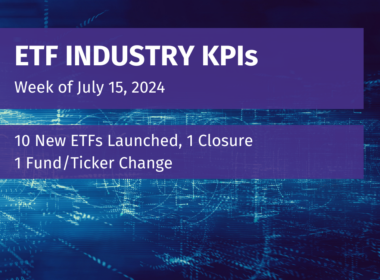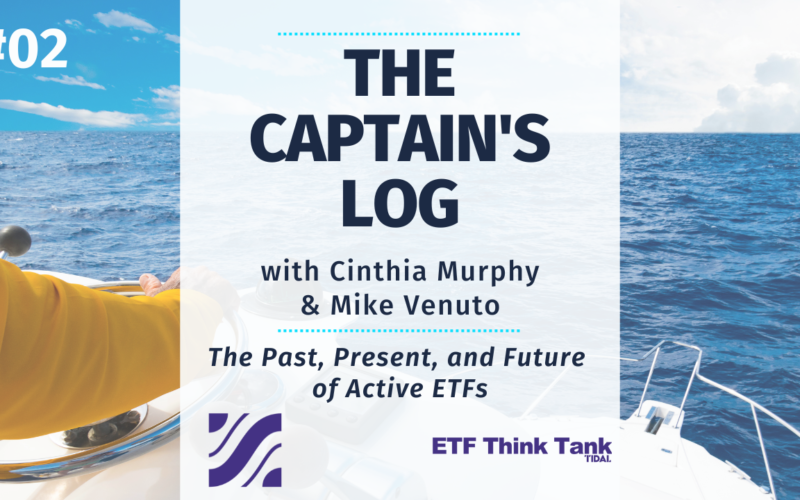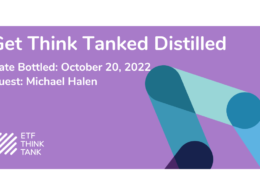In the hectic and crazy world of the financial markets and money management, the greatest asset in the toolbox might be a clear mind. Dr. Aaron Turner, the founder of One Thought, believes that all sorts of positive outcomes are possible simply by approaching situations with the right frame of mind. He joins the ETF Think Tank to discuss the ways people can improve their mindset in both their personal and professional lives.
A good starting point is to define what is meant by “clarity”. It’s not the absence of a certain emotion, but there is a certain emotional tone when you’re “in the zone”. When people are in an at-ease emotional state, their thinking is clearer, and decisions can be made more easily. That’s clarity. Better outcomes are achieved when thoughts flow more naturally and you see things with more perspective.
Originally, Turner had little interest in studying the mind at all. As he started to look into it a little more, he realized that it was so different from other fields of study. He learned that the key to gaining clarity and well-being is that people simply needed to understand the process of how it works. He believes that people can change their mindsets and improve their states of mind very quickly. Even though you may not be solving a problem directly, how you approach the problem mentally can inherently begin solving it. People’s lives can improve so much if their state of mind improves. People can get more done by working less, improving communication, and increasing engagement.
Identifying stress points can certainly improve one’s mental perspective. The state of mind is invisible. We can’t address it directly; we must address it indirectly. You need to understand how something affects you so that you can make the appropriate adjustments. People need to have a healthier relationship to negative thinking. If you have a negative thought about yourself, you need to handle or even ignore those thoughts.
What does mindfulness have to do with investments? It’s all about the approach. You know that a disturbed thought is going to cost you. You know you’re going to end up paying. If you feel like a client is being annoying, you’ll likely confirm your own thinking. If you’re annoyed, everything will be annoying. If you’re clear of mind, nothing is annoying. People need to become better at realizing when it’s time to take a pause or let something go instead of just driving ahead.
How does one get to the point of gaining clarity? The “how” is understanding. If you recognize your triggers and see that your state of mind is off, you’ve taken the first step. People should get to the point where they realize when not to give themselves the green light on something. You don’t just go with the state of mind you’re in. You end up validating that state of mind even if it’s negative.
Is this all about awareness? Are negative emotions always a bad thing when it comes to decision making? It can be useful if it wakes someone up and springs them into action. If you try to do something with that state of mind, however, it’s probably not going to be helpful. You’ll usually think of things you should or shouldn’t have done if you’d had a clear state of mind. There’s always going to be some disruption and dysfunction built into it.
Other key takeaways:
- There’s an element of myth busting to mindfulness. You don’t need to get angry or fired up about something to suddenly become good or successful at it.
- Is “sleeping on it” a good idea? That’s really more like saying you need to take a moment away from something and come back when you’ve cleared your mind. Look at things when you can trust your mind.
- I can’t see the wind, but I can see the effects of the wind. Start to get interested in the link between how you feel and how things play out. You can read the quality of conversation based on how agitated you were at the time. If your mind is at ease, you tend to function best.
You can watch a replay of this virtual happy hour on our YouTube channel here. While there, subscribe to our channel to stay up to date on our latest content.
Disclosure
All investments involve risk, including possible loss of principal.
The material provided here is for informational purposes only and should not be considered an individualized recommendation or personalized investment advice. The investment strategies mentioned here may not be suitable for everyone. Each investor needs to review an investment strategy for his or her own particular situation before making any investment decision.
All expressions of opinion are subject to change without notice in reaction to shifting market conditions. Data contained herein from third party providers is obtained from what are considered reliable sources. However, its accuracy, completeness or reliability cannot be guaranteed.
Examples provided are for illustrative purposes only and not intended to be reflective of results you can expect to achieve.
The value of investments and the income from them can go down as well as up and investors may not get back the amounts originally invested, and can be affected by changes in interest rates, in exchange rates, general market conditions, political, social and economic developments and other variable factors. Investment involves risks including but not limited to, possible delays in payments and loss of income or capital. Neither Toroso nor any of its affiliates guarantees any rate of return or the return of capital invested. This commentary material is available for informational purposes only and nothing herein constitutes an offer to sell or a solicitation of an offer to buy any security and nothing herein should be construed as such. All investment strategies and investments involve risk of loss, including the possible loss of all amounts invested, and nothing herein should be construed as a guarantee of any specific outcome or profit. While we have gathered the information presented herein from sources that we believe to be reliable, we cannot guarantee the accuracy or completeness of the information presented and the information presented should not be relied upon as such. Any opinions expressed herein are our opinions and are current only as of the date of distribution, and are subject to change without notice. We disclaim any obligation to provide revised opinions in the event of changed circumstances.
The information in this material is confidential and proprietary and may not be used other than by the intended user. Neither Toroso or its affiliates or any of their officers or employees of Toroso accepts any liability whatsoever for any loss arising from any use of this material or its contents. This material may not be reproduced, distributed or published without prior written permission from Toroso. Distribution of this material may be restricted in certain jurisdictions. Any persons coming into possession of this material should seek advice for details of and observe such restrictions (if any).












